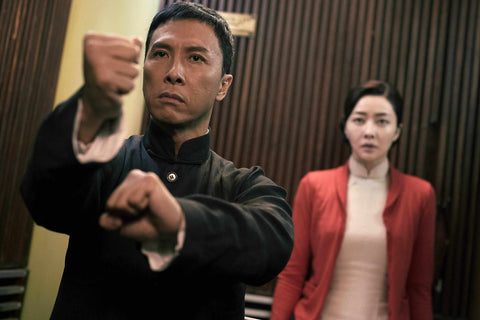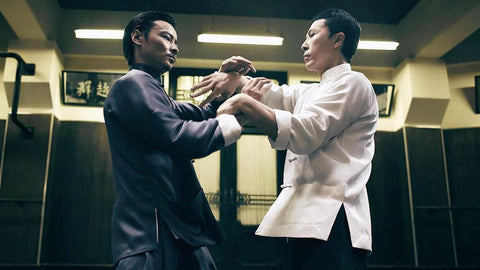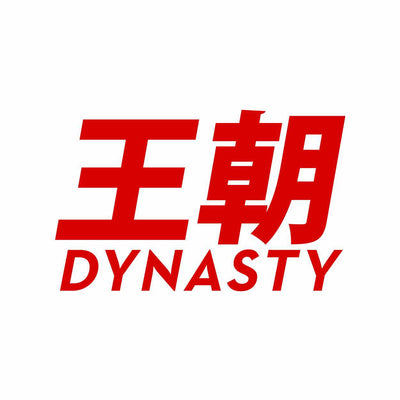TL;DR: The 'Ip Man' movie franchise is no more or less political propaganda than that of your average western superhero movie - a hero answers the call when his people are bullied by an enemy, and rises to defeat the enemy and teach them a lesson.
The only 'issue' critics have is that the 'hero' here happens to be a Chinese man who battles against anti-Asian racism, amidst a time when anti-China and anti-Chinese sentiment are at an all-time high, and having disdain for anything Chinese-related is considered socially acceptable, and even encouraged by mainstream / western media / society.
The American west has always found an enemy to vilify - whether it was the Russians or the Japanese. Now it's China's turn.
If 'Ip Man' was any other ethnicity or a movie from any other country other than China - would anyone even care?
If we equally love characters such as Iron Man, Captain America, Spider-Man, Superman, Batman, or even John Wick, then what is wrong with loving Ip Man?

Note: This is Part 1 of our 7,000+ word article analyzing the Ip Man movies, written by the Dynasty Team.
We are not paid by the Communist Party of China and we willingly wrote this blog for free in order to exercise our freedom of speech and to share our thoughts on Asian and Asian-American history.
Timing Is Everything

Ip Man (real life) and Bruce Lee.
The Ip Man movie series stars Donnie Yen as the legendary Wing Chun Grandmaster, who was also the real life Kung Fu teacher of Bruce Lee.
Since the release of Ip Man 4 in December of 2019 (the fourth and final entry from the decade-spanning Kung Fu franchise), there has been a bit of controversy surrounding the movie from moviegoers who like to view their films from a political lens.
Ip Man 4 had the lucky (or unlucky) timing of being released when political criticisms against China / Chinese government were (and still) at their highest.
Propaganda?

We live in strange times where almost anything and everything of what we hear in the news is politicized or weaponized with politics (or maybe, it has always been this way).
This is especially true when it comes to China, as over the last decade (and to be honest, the last century), the American and western mainstream media has promoted no small amount of Sinophobia against China / Chinese people.
The western media has done such a good job at spreading anti-China propaganda, that if you tried to speak up or say something positive about China, you will be largely met with dismissive responses such as labeling you a "communist" or a "shill" for the Communist Party of China (and usually from folks who've never even traveled to China or been outside of their home country).
We won't attempt to recall every incident, movie, TV show, or news story here, as there would be too much to list.
What we could all agree with is that if the Ip Man 4 movie came out 10 or 20 years ago, China would have not been the prime target in the average westerner's eyes and the world at large, and we wouldn't even be having this discussion or writing this blog post today.

Back in the day, Shaw Brothers, Golden Harvest, and Bruce Lee Kung Fu movies were actually quite popular and considered cool and edgy, and no one thought they were "Chinese propaganda".
But alas, here we are.
Critics have claimed that Donnie Yen, Danny Chan, and the filmmakers' political stance in being supportive of the Chinese government, as well as the subject matter of Ip Man 4 (Chinese people vs. American racism), equates the subsequent movie (or Donnie Yen's involvement in another film, Disney's Mulan) as a "pro-Chinese / pro-China propaganda" film.
That assertion is quite misleading, as Ip Man 4 is more indicative of an Asian-American history lesson, than it was a pro-China movie.
It certainly has even less to do with the Chinese government itself, as Ip Man 4's real life main characters lived the majority of their lives in Hong Kong and America (Ip Man and Bruce Lee, respectively), they speak the Guangdong dialect of Guangdonghua / Gongdong Wah / Cantonese, which is the dialect used in Hong Kong, and they represent the Chinese people rather than any political entity.
While this is a martial arts blog and we do not wish to engage in political discussions or debates, it has come to our attention that due to our current political climate, and how the Ip Man movies mixes its storylines with historical events and deals with themes such as racism, oppression, colonialism, imperialism, and national pride and dignity, it is inevitable that we must share our thoughts about the role that these Chinese Kung Fu movies play in our ever increasingly politicized and polarized society we live in.
Fictional Movies But With Real Themes

First of all, let's get this out of the way:
None of the movies based on Ip Man are 100% fact nor 100% historically accurate - in case this wasn't obvious already.
As indicated by the filmmakers Donnie Yen and Raymond Wong in past interviews, their idea behind the Ip Man movie franchise wasn't to create a documentary or autobiography of the Wing Chun master's life.
If they had done so, the movie would be very boring, and no one would want to watch it, as Ip Man was just a regular guy much like any one of us.
Instead, the filmmakers wanted to create a new martial arts franchise (similar to Jet Li with Wong Fei Hung / Once Upon A Time In China) that would be able to showcase Ip Man, a real life Chinese Kung Fu master, the struggles he overcame, the values he stood for, and his martial arts style of Wing Chun to a whole new generation of audiences.
One of the biggest draws to these Hong Kong martial arts movies are to watch their signature Hong Kong style Kung Fu action choreography and sequences, while absorbing a few history lessons along the way.
Knowing that martial arts movies, much like any other movie, are made mostly for entertainment / commercial reasons and to tell a story for moviegoers to relate to, let us take a look at what is fact and what is fiction in the Ip Man movie storylines.
We will save the deepest analysis for arguably the most significant movie of the franchise - Ip Man 4 - for last.
Ip Man (2008)

Did the Japanese invade China?
For those not well versed in Asian history, this was 100% fact.
The Imperial Japanese Army at the time invaded many Asian countries including China.
We will not go into gruesome details, but just know that this happened and the Japanese military killed millions of Chinese and other Asians at this time.
Did Ip Man fight the Japanese military / General Miura?

Both fact and fiction.
While the actual fight between Ip Man and General Miura was fiction, it was based on real events.
The Imperial Japanese Army at the time had heard of a great Chinese Kung Fu master who lived in Foshan (Faatsan), China, and wanted to scout and recruit him to train the Japanese military in Chinese Martial Arts.
They sent out a team to seek out this man named Ip Man, but Ip Man refused to teach the Japanese army any Kung Fu.
Shortly after, the Japanese army returned and sent a captain to challenge him in a fight.
By historical accounts, Ip Man defeated the Japanese captain who came to challenge him at his home within 30 seconds and sent him back with his tail between his legs.
After then, the Imperial Japanese Army no longer bothered Ip Man.
Ip Man 2 (2010)

Sammo Hung vs. Donnie Yen in Ip Man 2
By film producer Raymond Wong's account, he wanted to create a sequel to Ip Man (which became a box office hit and solidified Donnie Yen's career as a household name at the time) that focused on Ip Man and Bruce Lee's relationship in British-ruled Hong Kong (Hong Kong was colonized for 100 years under British rule after China lost the Opium Wars against Britain and had to sign the Unfair Treaties - an event again instigated by foreign powers wanting to invade and imperialize China).

Ip Man and his student Leung Sheung (Wong Shun Leung) in Ip Man 2.
But because the rights to Bruce Lee's character weren't finalized at the time, he instead focused the film on Ip Man's struggles in opening up his Wing Chun school in Hong Kong (after moving from Foshan, China), explore the treatment of Hong Kong people under British rule, as well as the western perceptions of Chinese Kung Fu / Martial Arts.
Ip Man Fought A British Boxer?

Fiction. Ip Man 2 needed some sort of a villain in the movie to fight with Ip Man, so the plot progressed from Ip Man's rivalry with Hung Gar master Hung Chun-nam (played by Sammo Hung) into a "Rocky 4"-esque combat sports showdown with a caricature of a villain at the end of the movie.
Due to this movie largely being fictional as the British boxer villain was never based on real events (as opposed to the Asian-American historical events of Ip Man 4 which we will explore below), depending on your mileage for national pride, you might have enjoyed Ip Man standing up for Chinese Martial Arts and Wing Chun Kung Fu by defeating the British boxer known as "Twister".
Ip Man 3 (2015)

In this film entry, the filmmakers decide to drop the national pride / political focus and center it instead on Ip Man being the friendly neighbourhood Kung Fu master, the beginnings of Ip Man's relationship with his student Bruce Lee, as well as his rivalry with fellow Wing Chun master Cheung Tin Chi / Master Z, who was based on real life Wing Chun master Sum Nung.
Ip Man Fought An American (Mike Tyson)? Ip Man Fought Another Wing Chun Master?

Both are fiction. Mike Tyson's character and the character of Cheung Tin Chi were part of Ip Man 3's plot to provide antagonists to Ip Man's protagonist to fight against.
Why did the filmmakers hide the racism Bruce Lee endured? Weren't Bruce Lee's Kung Fu brothers racist towards him and didn't want him to learn Chinese Kung Fu?
While Ip Man's Kung Fu students were racist against Bruce Lee (who was 1/4 German on his grandmother's side), Ip Man decided to teach Bruce Lee in private anyways despite the disdain and disapproval of others.
As evidence of their fond relationship, Ip Man and Bruce Lee took many photographs together, and Bruce Lee even purchased an apartment for Ip Man as promised once he returned from Hollywood as a successful film star, and attended Ip Man's funeral upon his passing.

Ip Man (real life) and Bruce Lee.
This shows that despite this part being left out in the movies, their real life relationship wasn’t tainted by racism and Ip Man never discriminated against him personally.
The filmmakers did not deliberately omit anything "negative" regarding Ip Man or Bruce Lee's relationship.
Wong Shun Leung - Bruce Lee's Kung Fu Mentor

Wong Shun Leung, a true Kung Fu fighter with dozens of rooftop fights under his belt, is known affectionately as "The King of Talking Hands".
Since the movies needed to focus on Ip Man's story, another detail that was left out was that Bruce Lee also received a lot of Wing Chun teachings from his Kung Fu "big brother" Wong Shun Leung (played by Huang Xiaoming in Ip Man 2 as the character of "Leung Sheung", Ip Man's first student in the movie).
A Kung Fu legend in his own right, Wong Shun Leung first trained in western Boxing, but converted to training Wing Chun when he met Ip Man.
A mere few months after starting his training in Wing Chun, he was already gaining notoriety for using this style to fight and defeat dozens and dozens of challengers in illegal rooftop fights back in 1950-1960's Hong Kong.

What Rickson Gracie is to Brazilian Jiu-Jitsu, Mas Oyama is to Kyokushin Karate, Wong Shun Leung probably is for Wing Chun, because more than any other person (aside from Ip Man), he put the style of Wing Chun on the map as a fighting system to be respected by being an actual fighting Kung Fu master that was willing to take on all comers.
Despite the popular accepted story of Ip Man being Bruce Lee's only teacher, many sources verify that Wong Shun Leung was the person who Bruce Lee learned the majority of his Kung Fu and Wing Chun (Ving Tsun as it's known now under Wong Shun Leung's lineage) fighting skills from.

Wong Shun Leung visited Bruce Lee on one of his movie sets, Enter The Dragon, and provided some fight choreography tips.
Wong Shun Leung was his longtime Kung Fu brother and friend, and they continued to share messages and talk about Kung Fu years after Bruce had left for Hollywood.
Wong Shun Leung even had disagreements with Bruce Lee and sparred / fought with him, later on convincing him that his martial art of "Jeet Kune Do" was merely his incomplete interpretation and understanding of the Wing Chun system, which Bruce never completed due to time constraints.

Once again, this shows that Wong Shun Leung wasn't a racist, and didn’t hide any Kung Fu from Bruce Lee, and both Bruce Lee and Wong Shun Leung went on to teach many other foreigners Kung Fu.
What We Learned About Asian American History in Ip Man 4
Due to the amount of historical knowledge we are about to share regarding the final Ip Man film, we decided to split this write up into a Part 2 and dedicate an entire post to Ip Man 4.
Continue reading our in-depth analysis of Ip Man 4 and our final closing thoughts here.
- Dynasty Team

